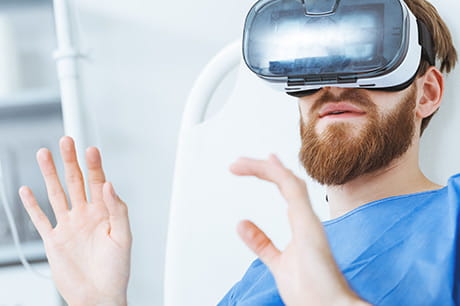Using virtual reality to manage pain and enhance patient experience
AppliedVR™ is the leader in therapeutic virtual reality (VR). Since its founding in 2015, the company has delivered scientifically designed and validated digital health solutions to over 30,000 patients in more than 250 hospitals in 8 countries worldwide.
Their approach features VR headsets that run content modules from the company’s extensive library of immersive therapeutics. The content modules transport patients to environments that teach essential skills for coping with pain. The content modules cover breathing techniques, mindfulness, positive thinking and more.
The company’s platform has been used to impact chronic and acute pain as well as anxiety experiences before, during and after surgery, childbirth, oncology infusions, emergency room procedures and rehabilitation sessions.
The problem:
AppliedVR is a well-established general wellness and digital health organization evolving into a class II medical device company in an effort to provide greater access to potential VR therapeutics for patients. To meet requirements for FDA clearance, AppliedVR was looking to partner with innovative medical centers to collaborate on clinical and health economic outcomes research studies.
“We saw Geisinger as an innovative organization with an interest in integrating technology into medicine,” explains Tyler Chavez, PhD, director of Strategic R&D Partnerships at AppliedVR, who is managing the AppliedVR–Geisinger partnership. “When Geisinger’s former CEO introduced us to Dr. Karen Murphy at the Steele Institute, we knew we’d found the partner we were looking for.”
The solution:
Working with the Steele Institute for Health Innovation has enabled AppliedVR to conduct proof-of-concept and pivotal trials using adult patients undergoing total knee arthroplasties. The studies focus on the use of VR to modulate postoperative pain and potentially reduce the amount of opioids needed for pain management. Pain and opioid use are being measured over the course of patients’ recoveries, both inpatient and at home.
“The Steele Institute gave us everything we were looking for and more,” says Dr. Chavez. “It has not only provided project management support and introductions to champions throughout Geisinger, it has also greatly supported the facilitation of two National Institutes of Health grants to study acute and chronic pain. We also received clinical expertise on study design and support in our engagement with the U.S. Food and Drug Administration from the chair of Geisinger’s Musculoskeletal Institute and Department of Orthopaedic Surgery, Dr. Michael Suk.”
The outcome:
AppliedVR’s studies with orthopaedic patients at Geisinger are ongoing, and a study on using VR for chronic lower back pain is in development with funding from the National Institute on Drug Abuse. The company continues to engage with the Geisinger team to find new ways of developing treatments for patients in need.
“We believe that if VR can modulate pain in a meaningful way, patients at Geisinger will be able to reduce their reliance on opioids,” Dr. Suk explains. “This has the potential to not only reduce the amount of opioids used in the hospital but also during at-home recovery. This project is a model example of industry and our clinical enterprise collaborating to positively impact patient outcomes.”
Their approach features VR headsets that run content modules from the company’s extensive library of immersive therapeutics. The content modules transport patients to environments that teach essential skills for coping with pain. The content modules cover breathing techniques, mindfulness, positive thinking and more.
The company’s platform has been used to impact chronic and acute pain as well as anxiety experiences before, during and after surgery, childbirth, oncology infusions, emergency room procedures and rehabilitation sessions.
The problem:
AppliedVR is a well-established general wellness and digital health organization evolving into a class II medical device company in an effort to provide greater access to potential VR therapeutics for patients. To meet requirements for FDA clearance, AppliedVR was looking to partner with innovative medical centers to collaborate on clinical and health economic outcomes research studies.
“We saw Geisinger as an innovative organization with an interest in integrating technology into medicine,” explains Tyler Chavez, PhD, director of Strategic R&D Partnerships at AppliedVR, who is managing the AppliedVR–Geisinger partnership. “When Geisinger’s former CEO introduced us to Dr. Karen Murphy at the Steele Institute, we knew we’d found the partner we were looking for.”
The solution:
Working with the Steele Institute for Health Innovation has enabled AppliedVR to conduct proof-of-concept and pivotal trials using adult patients undergoing total knee arthroplasties. The studies focus on the use of VR to modulate postoperative pain and potentially reduce the amount of opioids needed for pain management. Pain and opioid use are being measured over the course of patients’ recoveries, both inpatient and at home.
“The Steele Institute gave us everything we were looking for and more,” says Dr. Chavez. “It has not only provided project management support and introductions to champions throughout Geisinger, it has also greatly supported the facilitation of two National Institutes of Health grants to study acute and chronic pain. We also received clinical expertise on study design and support in our engagement with the U.S. Food and Drug Administration from the chair of Geisinger’s Musculoskeletal Institute and Department of Orthopaedic Surgery, Dr. Michael Suk.”
The outcome:
AppliedVR’s studies with orthopaedic patients at Geisinger are ongoing, and a study on using VR for chronic lower back pain is in development with funding from the National Institute on Drug Abuse. The company continues to engage with the Geisinger team to find new ways of developing treatments for patients in need.
“We believe that if VR can modulate pain in a meaningful way, patients at Geisinger will be able to reduce their reliance on opioids,” Dr. Suk explains. “This has the potential to not only reduce the amount of opioids used in the hospital but also during at-home recovery. This project is a model example of industry and our clinical enterprise collaborating to positively impact patient outcomes.”

Content from General Links with modal content
